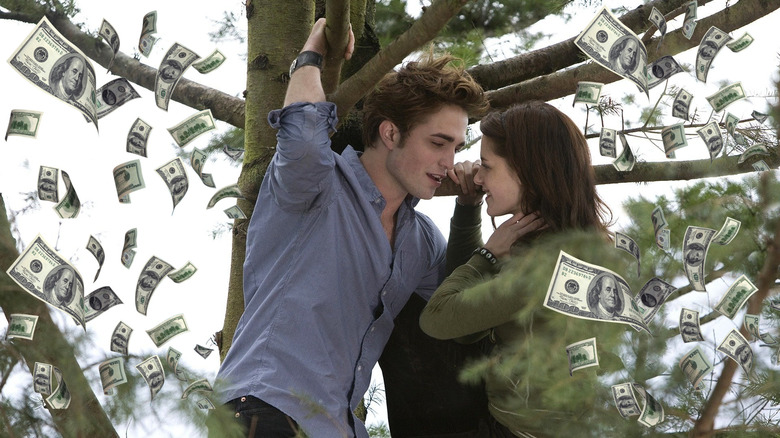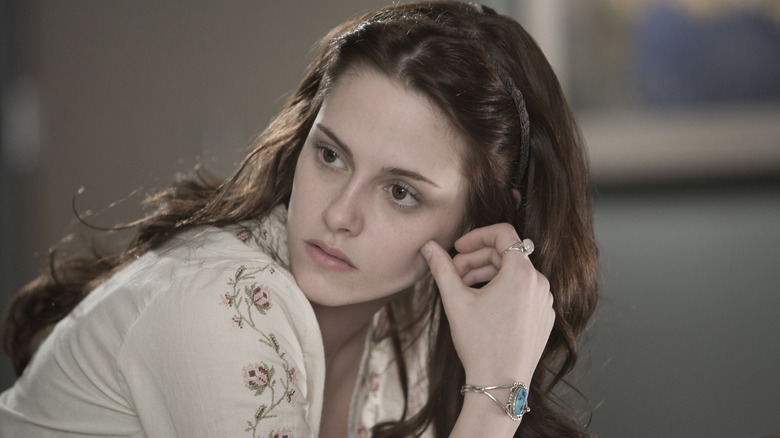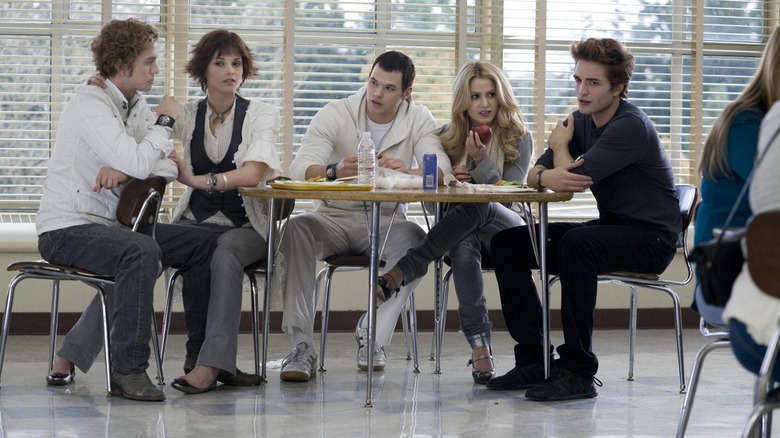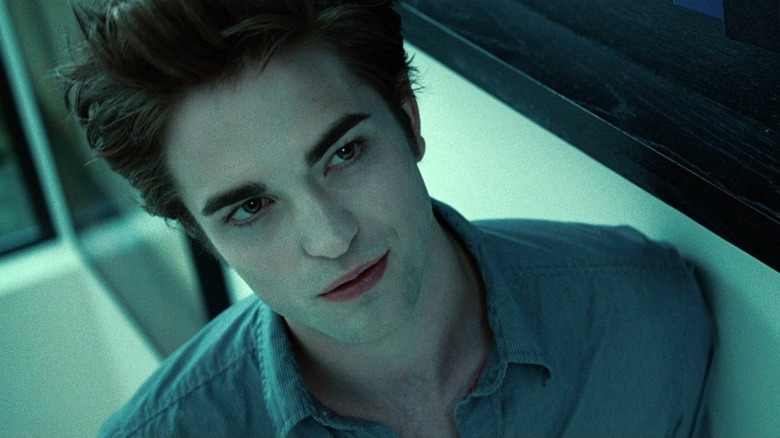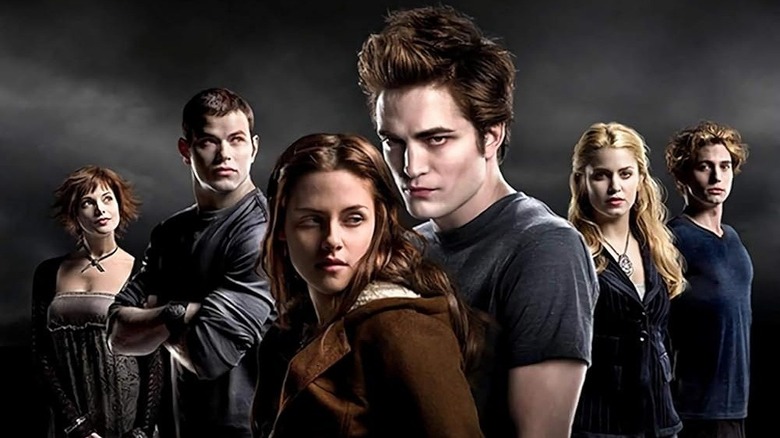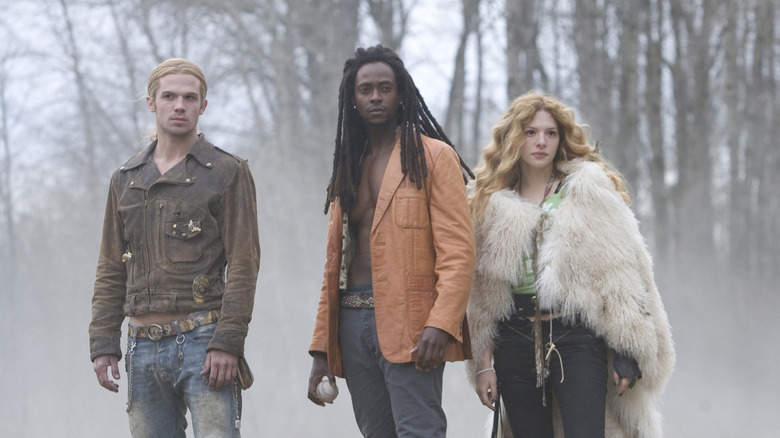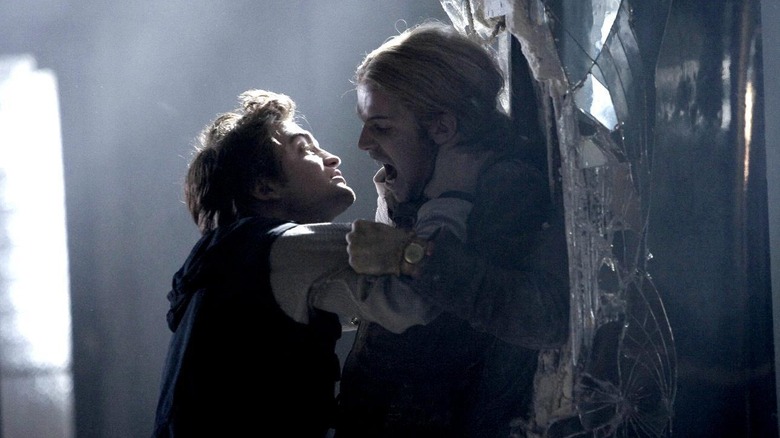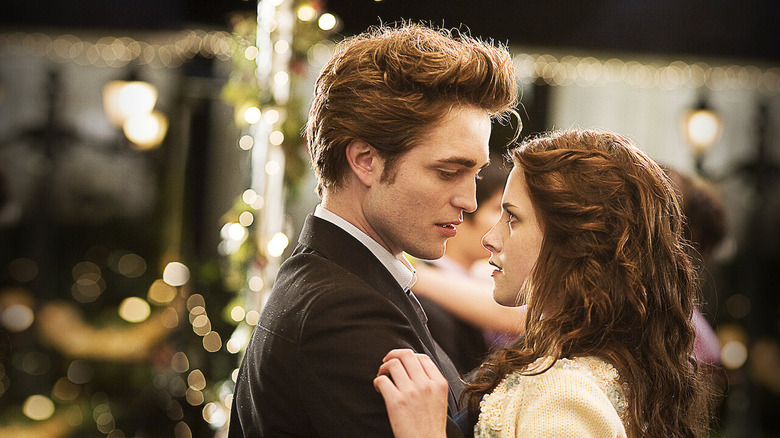Twilight's Unbelievable Box Office Run Was A Painful Loss For Paramount Pictures
(Welcome to Tales from the Box Office, our column that examines box office miracles, disasters, and everything in between, as well as what we can learn from them.)
"I think 'Twilight' could be huge." Those were the words that were once said to be uttered by Paramount's former co-president of production Karen Rosenfelt, who helped turn the YA novel into a movie. While the movie ultimately wouldn't be made at Paramount, it turns out she was more right than anyone could have possibly predicted. In the end, Paramount's loss would turn into Summit Entertainment's ridiculous gain as the movie based on Stephenie Meyer's best-selling book would kick off not just a billion-dollar franchise, but an entire blockbuster YA craze.
It's easy to take for granted now, but the saga of Bella and Edward — which is now ingrained in popular culture — did not reek of success at the outset. Meyer was not an author by trade and had essentially no experience before writing "Twilight." Movies based on YA fantasy/sci-fi weren't regular cannon fodder for Hollywood franchises at that time, and having a woman at the helm of a blockbuster franchise was, sad to say, nearly unheard of. Against the perceived odds, the books and the films generated untold millions for all involved. Paramount may have missed out on a once-in-a-lifetime gold mine while Summit made a name for itself on the back of this vampiric love story.
In this week's Tales from the Box Office, in honor of the 15th anniversary of "Twilight," we're looking back at the movie, how Summit Entertainment scored the hit of a lifetime, how Paramount Pictures let that same hit slip through its fingers, what happened after the movie became a hit, and what lessons we can learn from it all these years later. Let's dig in, shall we?
The movie: Twilight
The story of "Twilight" all starts with a dream. As cliche as that sounds, the story originally came to Stephenie Meyer in a dream and she immediately set about turning that dream into a novel. She wrote the whole thing in three months. "I don't think I'm a writer; I think I'm a storyteller," Meyer said to Time in April 2008. "The words aren't always perfect." Indeed, the writing itself may have been criticized by critics but it hardly mattered. The story resonated with its intended young adult audience when it was published in 2005.
The story centers on a teenager named Bella Swan who moves to a small town in the Pacific Northwest where she quickly falls in love with a mysterious boy named Edward Cullen. The catch? He turns out to be a 108-year-old vampire. It was on the New York Times Best Seller list within a month of release. Naturally, Hollywood would soon come calling. Originally, it was Greg Mooradian who brought the manuscript to David Gale, the then-head of Paramount's MTV Films. Rosenfelt convinced Paramount to acquire the rights and Mark Lord was hired to write the screenplay — one that differed greatly from the version that eventually made it to screen.
The project languished in development hell at Paramount for several years before the rights lapsed in April 2007. That's when Summit Entertainment pounced, with the company's then-president Erik Feig seeing the potential. He wasted no time in getting things moving in the right direction. Catherine Hardwicke ("Lords of Dogtown," "Thirteen") was set to direct the film adaptation of Meyer's book in late 2007 but it wasn't easy to get her to sign on. After being handed five scripts from Summit, including one for "Twilight," the director wasn't having it. "I did not respond to any of them," she said to Vanity Fair in 2018. "I just threw 'em all in the trash." That changed once she read Meyer's book.
Staying faithful to the source material
At the time, it was rare for a woman to be handed the reins to a big movie, and Hollywood at large seemed to have little faith in the project. "An executive once told Hardwicke that her film might be interesting, at most, to about 400 girls in Salt Lake City," that same Vanity Fair piece explained. "They kept saying that to shoot the cost down, but it was a perfect storm at the time," the director said. As proof of just how little respect female filmmakers received at the time, Hardwicke was removed from the franchise and did not return to direct the sequels. But that's another story entirely.
Melissa Rosenberg ("Step Up") was hired to pen a new version of the screenplay. Hardwicke wanted it reworked and the idea was to stay more faithful to what Meyer put on the page. Rosenberg, speaking to Premiere in October 2008, had this to say about it:
"I was confident because my take was that it was a great book and that we should stick to the book as our bible. And I think that's what they were hoping for because there was actually an earlier version at Paramount that they threw out. I remember Stephenie saying it was a great script; it just had nothing to do with the book. And with a project like this, you can't really veer away from the book."
Indeed, Lord's script was a radical departure involving, among many other things, Bella escaping the FBI on a jet ski. It was the opposite of a faithful adaptation. "The earlier script that they had before was just pretty crazy. Bella was a track star in the first scene," Hardwicke, said to MediaBlvd Magazine in September 2008 "I read it and was like, 'This isn't the girl from the book that I love!' So, everybody wanted to make it as close to the book as possible. The book is long, so we can't have every scene, but we did the sweetened, condensed milk version."
'Who in the world could possibly live up to that?'
Despite Summit's faith in the source material, the studio was still determined to make the movie on the cheap. "They came to me and said, 'You've got to find a way to cut $4 million out of the budget in the next four days, or we're pulling the plug,'" Hardwicke said in that same Vanity Fair piece. "They said, 'Great, glad you cut it.' And then we made the movie." The budget, all told, was $37 million with a relatively minimal marketing spend.
Budget constraints aside, the hardest part was nailing the casting of Bella and Edward. If this movie went well, it would inevitably become a "Harry Potter" situation where these actors would be playing the roles for some time, as Meyer had already written several follow-up novels. "As you can imagine, when you read Stephenie's description of Edward, you're like, 'Who in the world could possibly live up to that?'" Hardwicke said in that MediaBlvd interview.
After a rugged series of auditions, they landed on Robert Pattinson. Though he's become an A-lister now and is leading gigantic hits like "The Batman," as well as acclaimed indies such as "Good Time," he was very much an up-and-comer at that moment. His biggest claim to fame was Cedric Diggory in the "Harry Potter" films. Even though fans ultimately went nuts for Pattinson, it wasn't exactly a happy marriage on set.
"I was 21 and kind of wanted to make it as arty as possible," Pattinson said to GQ in 2022. "We had this strange tension where the studio was a little bit scared to make things a little bit too emo and stuff, and I thought that was the only way to play it." At one point, the actor's team visited the set to let him know that he was on the verge of being fired.
"At lunch, they were like, 'OK, so whatever you're doing right now, after lunch just do the opposite or you'll be fired by the end of the day.'"
'It's such an obvious choice'
Much like Pattinson, Kristen Stewart was a very promising up-and-comer at the time this movie was coming together. She had starred in films like "Panic Room" but had yet to truly break out. She has since become one of the most respected actors working today, earning an Oscar nomination for her role in "Spencer." But it's "Twilight" that put her on the A-list. It's also Stewart who helped to ensure that Pattinson would play Edward. Speaking with Vanity Fair in November 2008, she explained:
"I basically cast him. We did one day of auditions and a bunch of guys came in. Catherine Hardwicke, the director, afterwards was like, 'What do you think? This is such a hard choice.' I was like, 'Are you kidding me!? It's such an obvious choice!' It couldn't have been better. It was sort of perfect."
While much has been said of the movies in the years since their release, Stewart certainly didn't look down on the material when taking on the role. "I thought it was really ambitious, this portrayal of the ultimate, most epic love story that could be," the actress said in that same interview. The rest of the cast would be filled out with similarly promising newcomers as well as sturdy character actors including Anna Kendrick, Taylor Lautner, and Billy Burke.
It's also important to note that Summit, at the time, was independent and not yet owned by Lionsgate. The studio was trying to make bigger waves in Hollywood, and this project was viewed as a big step in that direction. "Youth-oriented movies are definitely a major part of our business," Erik Feig said to THR in 2007. "Willie Sutton said he robbed banks because that's where the money was, and you can say the same of these kinds of movies since young people are the ones who go to the movies every weekend." Little did Feig know that they were about to start a YA revolution.
The financial journey
"Twilight" was released in theaters just ahead of the Thanksgiving holiday on November 21, 2008. Box office tracking numbers for the film just kept going up and up in the weeks leading up to the release. Buzz was so strong that the studio essentially got a ton of free press from magazines like Entertainment Weekly, which devoted lots of ink to the budding sensation. It was the perfect storm for a surprise hit.
The film debuted to a shockingly large $69.6 million, easily taking the top spot at the box office. It trounced Disney's family-friendly "Bolt" and "Quantum of Solace" — Daniel Craig's second turn as James Bond — the sequel to the much-beloved "Casino Royale" which was in its second weekend. Hardwicke's adaptation held strong over Thanksgiving, taking in $39.5 million over the five-day holiday stretch. It was a smash hit that kept putting butts in seats well into the new year. All told, "Twilight" took in $192.7 million domestically to go with $214.4 million internationally for a grand total of $407.1 million. Or nearly 11 times its trimmed-down production budget.
The money didn't stop there either. "Twilight" was also the top-selling DVD of the year, bringing in tens of millions more in revenue for the studio. Stewart and Pattinson reunited for a total of four sequels adapting the rest of Meyer's books, with the films bringing in a combined $3.3 billion globally. That's to say nothing of further DVD sales, cable rights, and merchandise. Not to mention the 160 million copies of the books that have been sold to date. It became a multi-billion-dollar juggernaut.
Moreover, the success of "Twilight" gave way to a YA franchise boom with series like "The Hunger Games" and "Divergent" following in those same footsteps. The success also led Summit to be acquired by Lionsgate in a $412 million deal in 2012 ahead of the release of "The Twilight Saga: Breaking Dawn Part 2."
The witch hunt at Paramount
Lionsgate chased that success with "The Hunger Games" in 2012, which itself spawned a $3 billion franchise. Much champagne was popped and many millions were spread around to those who were involved. Pattinson and Stewart became huge stars, Meyer became hilariously wealthy, and the most successful vampire franchise in cinematic history was born. It was a success on an almost hilariously massive scale. That did not go unnoticed by Paramount.
In a January 2009 report by The Wrap, it was revealed that the studio did not take losing the rights to "Twilight" very well. Mind you, this was before the sequels would go on to make nearly $3 billion worldwide. After the movie was released, a "witch hunt" ensued behind the scenes at Paramount in an attempt to find out who was responsible for letting the rights lapse. Studios frequently pass on projects only for them to get made elsewhere, but rarely do they become franchise-spawning hits of this size.
Karen Rosenfelt eventually left her post at Paramount but still believed strongly in "Twilight." She stayed on as a producer and tried to find the project a home after her former studio let it go. She even tried to strike a co-production deal between Paramount and Fox 2000, giving the studio yet another bite at the apple. It didn't work. That's when Rosenfelt met Feig and told him she thought "Twilight" could be huge. He believed her. The rest is history.
While Paramount eventually moved on, the ghosts of Edward and Bella would eventually circle back around. Wyck Godfrey, who was a producer on the "Twilight" films, was named Motion Picture Group President at Paramount. He would leave that role in 2020, but the fact that a key producer on the studio's white whale eventually took over as head of the movie division is a sweet bit of Hollywood poetry.
The lessons contained within
Several lessons stand out like a sore thumb looking back on everything that happened with this film. First and foremost, it's amazing that Hardwicke hasn't had a bigger career. Yes, she still works regularly but the fact that she didn't direct any of the sequels, nor has she had many cracks at franchises since, is appalling. But she did help pave the way for other women directors, with the likes of Patty Jenkins going on to direct the smash hit "Wonder Woman," and Greta Gerwig directing this year's "Barbie," which is now one of the highest-grossing films ever. Hardwicke deserves more credit than it seems she receives.
The other thing is, of course, the all-timer of a fumble that was Paramount letting the rights go. There is no question that some heads rolled behind closed doors because of that one. Credit to Rosenfelt for believing in it even after she left the studio, and to Feig for recognizing the potential there. Summit didn't let the project languish in development — they got the lead out and got the movie made.
That having been said, much has been made of the downright baffling script that Mark Lord wrote for Paramount. It was by no means faithful to what Meyer wrote. It almost seemed like that script was ashamed of the source material. It's hard to deny that a big part of the success of "Twilight" — despite the lack of critical acclaim — was staying true to the spirit of what made the book a hit in the first place. If Paramount had made their version, we might be talking about this whole thing in a very different way. As it stands, we're now living in a world where Lionsgate is trying to bring the saga back as a TV series. Much like Edward Cullen, "Twilight" feels destined to live forever.
